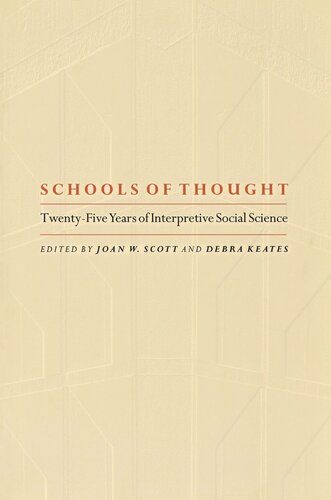

Most ebook files are in PDF format, so you can easily read them using various software such as Foxit Reader or directly on the Google Chrome browser.
Some ebook files are released by publishers in other formats such as .awz, .mobi, .epub, .fb2, etc. You may need to install specific software to read these formats on mobile/PC, such as Calibre.
Please read the tutorial at this link: https://ebookbell.com/faq
We offer FREE conversion to the popular formats you request; however, this may take some time. Therefore, right after payment, please email us, and we will try to provide the service as quickly as possible.
For some exceptional file formats or broken links (if any), please refrain from opening any disputes. Instead, email us first, and we will try to assist within a maximum of 6 hours.
EbookBell Team

5.0
50 reviewsSchools of Thought brings together a cast of prominent scholars to assess, with unprecedented breadth and vigor, the intellectual revolution over the past quarter century in the social sciences. This collection of twenty essays stems from a 1997 conference that celebrated the twenty-fifth anniversary of the Institute for Advanced Study's School of Social Science. The authors, who represent a wide range of disciplines, are all associated with the School's emphasis on interpretive social science, which rejects models from the hard sciences and opts instead for a humanistic approach to social inquiry.
Following a preface by Clifford Geertz, whose profound insights have helped shape the School from the outset, the essays are arranged in four sections. The first offers personal reflections on disciplinary changes; the second features essays advocating changes in focus or methodology; the third presents field overviews and institutional history; while the fourth addresses the link between political philosophy and world governance. Two recurring themes are the uses (and pitfalls) of interdisciplinary studies and the relation between scholarship and social change. This book will be rewarding for anyone interested in how changing trends in scholarship shape the understanding of our social worlds.
The contributors include David Apter, Kaushik Basu, Judith Butler, Nicholas Dirks, Jean Elshtain, Peter Galison, Wolf Lepenies, Jane Mansbridge, Andrew Pickering, Mary Poovey, Istvan Rev, Renato Rosaldo, Michael Rustin, Joan W. Scott, William H. Sewell, Jr., Quentin Skinner, Charles Taylor, Anna Tsing, Michael Walzer, and Gavin Wright.